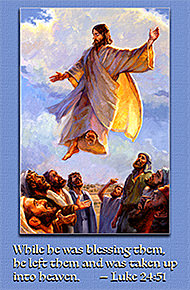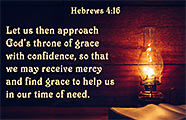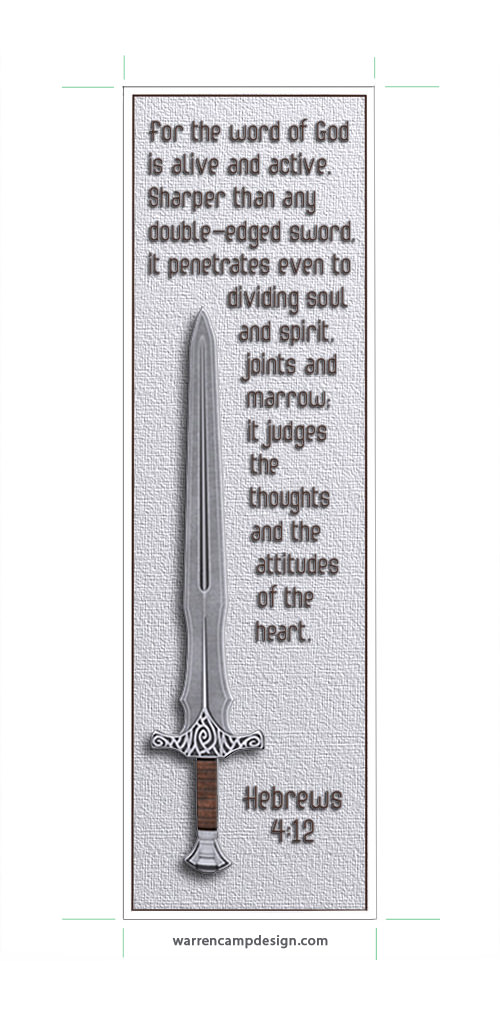Hebrews 4:11–16 . . .
“Jesus, the Great High Priest”
Looking back at previous discussions of "Hebrews," we were shown in the first two chapters that Jesus is vastly superior to angels. In chpt. 3, it became clear that Lord Jesus is also superior to Moses (3:1–6). From there, the author establishes in the text of 3:7–19 his exhortation highlighting the last half of Psalm 95, which urges the Israelites of those days to gather for worship and encouragement, thereby stimulating faith and perseverance. In Warren's previous commentary, he evaluated the blessing of God's promised "rest" and what it takes to enter his rest and gain from it.
Today's summary will focus on the meaning of the author’s concluding three-part exhortation, which aims to demonstrate how we readers are to apply the principles regarding "rest" that he underscored in vv. 1–10. We're told first to "make every effort to enter that rest" (vv. 11–13). Otherwise, a failure to heed God's Word will have dire consequences. Secondly, we're exhorted to "hold firmly to the faith we profess" (vv. 14–15), thereafter with conviction to "approach God’s throne of grace with confidence" so that we can be beneficiaries of the blessings of mercy and grace made available to us by Jesus, the great high priest.
Make Every Effort to Enter that Rest (4:11–13)
When you read Scriptures, do you hear God speaking to you? It's easy for us to become somewhat casual or indifferent in our reading of Scripture. Each of us has a Bible, probably multiple copies; we also have unlimited online access to it. When we read it, his "Word" might become just "words" to us; we likely forget that God is speaking his words directly to us, as if Jesus had entered our room and begun to speak words that are "alive and active"! So the following warning is solemn: When you hear God's Word, don't harden your heart against it because it's God's voice that's speaking to you.
We've already been exhorted to pay more careful attention to what God has revealed through his Son (2:1–4). Now we're exhorted to diligently try to attain God's Sabbath-rest, which awaits our entrance.
11Let us, therefore, make every effort to enter that rest, so that no one will perish by following their example of disobedience.
12For the word of God is alive and active. Sharper than any double-edged sword, it penetrates even to dividing soul and spirit, joints and marrow; it judges the thoughts and attitudes of the heart. 13Nothing in all creation is hidden from God’s sight. Everything is uncovered and laid bare before the eyes of him to whom we must give account (4:11–13).
The first exhortation begins in v. 11: "Let us, therefore, make every effort to enter that rest, so that no one will perish by following their example of disobedience." What a tragedy that some would perish by stopping short, failing to take hold of and believe God's promise. So let's be diligent to enter that rest; let none of us fall by following Israel's example. Remember: This epistle was written to people who were church-body members who'd heard God's Word and professed to believe. It wasn't written to pagan Romans who didn't know God and who'd been idol worshipers. It was aimed at people who'd heard God's Word but didn't fully believe it, which was a very serious situation.
Remember, too, that such "rest" is spiritual and eternal, offering grace here on earth with Christ, and glory hereafter with him in heaven. But the only way to this rest requires diligent labor; those who don't make the requisite effort will never receive such rest. Let us, therefore, make that effort, while calling upon one another to act in earnestness. Such an effort must not be made in the flesh; we must use the power of Jesus' Spirit to enter that rest. First and foremost, we're to believe in Jesus Christ!
That leads us to v. 12, which begins with the preposition “For,” indicating that this exhortation is based on what has already been said in v. 11. Being told that “the word of God is alive and active,” it’s important to realize that God’s Word comes from numerous sources: the Law and the Prophets; Jesus, known as the Word (John 1:1); the Scriptures; the work of the Spirit of Jesus in our lives; and the preaching and teaching of the gospel and Scriptures.
In addition, it’s essential that we effectively realize that God’s Word “penetrates even to dividing soul and spirit” and “judges the thoughts and attitudes of the heart.” Sharper than a two-edged sword, his Word is able to discern our heart’s intentions (enlarge the images and print Warren's Bible bookmark of 4:12).
The phrase "double-edged sword" is common in Scripture so it must be pretty important. Like a sharp sword that can open the human body with one slashing blow, the "sword of Scripture" can open our inner life, exposing it to ourselves and others. Such honest revelation is what we need to humble our stubborn pride and render us eager to look to God for his gracious supply of forgiveness.
None of us can escape the threatening judgment of God. The author introduced the idea of the all-seeing God in v. 12c, and continues it here: "Everything is uncovered and laid bare before the eyes of him to whom we must give account" (v. 13). His Word reveals who and what we are. No one escapes what God's eyes can see. The danger for those Hebrew readers, who were probably in a local congregation, was that they thought they could hide things from God. In reality, then and today, the Word of God fully exposes people as they are.
A High Priest Who Did Not Sin (vv. 14–15)
The remaining verses of chpt. 4 introduce to us a powerful theme that will be developed fully in chpt. 5. It's the major theme of "Hebrews": the high priesthood of Jesus. Thus far we've learned that Jesus is far greater than any angel; he eclipses Moses as the spokesman of God; and he leads believers into a far superior rest than that to which Joshua had led the Israelites. We'll see Jesus as superior in every respect to Aaron's priesthood, encompassing a ministry that the Old Testament only faintly suggested in the mysterious ministry of Melchizedek to Abraham. Get ready now to be personally introduced to Jesus, the great high priest of all time.
Jesus the Great High Priest
14Therefore, since we have a great high priest who has ascended into heaven, Jesus the Son of God, let us hold firmly to the faith we profess. 15For we do not have a high priest who is unable to empathize with our weaknesses, but we have one who has been tempted in every way, just as we are — yet he did not sin (4:14–15).
In Israel, the high priest was responsible for administering the sacrificial system that God had established for various purposes, with atonement for sins being the most important. Only the high priest was allowed into the Holy of Holies — the dwelling place of God — and only on the Day of Atonement. He also presided over the Sanhedrin, the highest authority over all matters in Israel, both religious and civil. Jesus, who assumed the role of high priest, has therefore become our intermediary with God and the ultimate arbiter of salvation.
... gospelimages.com

Click to enlarge and download this
contemporary painting of Luke 24:51
highlighting Jesus’ ascension.
The writer of "Hebrews" tried to help his readers grasp the full import of Jesus' high-priest ministry. In v. 14, he begins an extended discussion of that ministry; it concludes at 7:28. The opening “Therefore” looks back to the previous verse (v. 13), where the human race is viewed as being totally vulnerable before God's all-seeing eyes. Our writer possibly has Adam and Eve in mind: They suddenly became aware of their nakedness and sought to hide from God in the Garden. But we who believe in Jesus, while naked before God, don't need to hide. With the Son of God in front of us, we can "approach the throne of grace with confidence" (v. 16).
Jesus, our great high priest has the power and the authority to accomplish anything according to his will. He's a high priest who's the Son of God, who'd "ascended into heaven." This brings to mind the resurrection and ascension of our Lord to God's right hand (1:3). Sitting enthroned at Father God’s right hand, we ought to wonder: What better, what closer, what more influential place could there be for the One whose task is to represent man before God (5:1)?
Since Jesus is our great high priest, the One who's "ascended into heaven," we can and must hold tightly to our professed faith. He took his own blood into the most holy place in heaven, so that God would forgive our sins. The good news is that God accepted High Priest Jesus’ most-valuable personal sacrifice. Father God then gave his Son the most important place in heaven: on the throne at the Father’s right side (1:3).
It's not only comforting but very reassuring to realize that we have the opportunity to personally approach the One who wants very much to help us, the One who understands our weakness and sympathizes with us (4:15). Jesus is the high priest who can truly help; his incarnation hasn't only qualified him to represent man before God, it gave him the ability to empathize with everyone, especially the weak. The Lord Jesus has the divine ability to sympathize, not because he wrestled with sin and lost, but because he personally experienced temptation and prevailed.
Better yet, he proposes, simply and clearly, to meet every situation; not with human wisdom but divinely; not with mere human strength, but God’s all-encompassing power.
The justification for our great high priest’s sympathy is that he’d fully shared our plight. This epistle’s author has already reminded his readers that Christ Jesus was “made fully human in every way” (2:17) and that this was done “through what he suffered” (2:10). Here we’re told that he “has been tempted in every way, just as we are” (v. 15).
Confidentially Approach God’s Throne of Grace (v. 16)
We've come to the third "Let us" exhortation wherein we're assured that we can approach the great high priest confidently because he has the power, authority, and ability to come to our aid. Having "ascended into heaven," he now sits at the Father’s right hand, ready and able to help.
16Let us then approach God’s throne of grace with confidence, so that we may receive mercy and find grace to help us in our time of need (4:16).
When we approach "God's throne of grace," we can be sure we'll receive his grace whenever we need help, especially when we confidently ask for it in prayer. The Greek word parresia for "confidence" or "boldness" comes from two words, pas (all) and rhesis (speaking); it literally suggests "boldness, frankness, forthrightness, and outspokenness." The author is encouraging us to approach the throne of grace with confidence or boldness, ready and eager to be very direct about telling him we need help. He encourages us to speak up and be bold when we pray. What a privilege! We shouldn’t imagine that we'll approach God’s throne of grace only after our death and resurrection. Instead, we approach his throne of grace whenever we pray to God.
See this enlightening account of v. 16 from a sermon by Pastor Ray C Stedman: "The 'throne of grace' to which we come for help is pictured by the mercy seat in the old tabernacle, where God could meet with sinful humans because of the blood of sacrifice sprinkled upon it; it's the throne of power in the universe from which grace constantly flows to needy suppliants. Mercy is the remission of deserved judgment, while grace is the supply of undeserved blessing. Both are needed by sinful believers, such as we all are; both are available to us when we come with confidence. We are loved as children and cherished as recipients of the great salvation won by the blood of our great high priest!"
After already comparing Christ’s person to the angels and Moses, the author begins his comparison of Christ to the priests who mediated Mosaic Law. He asserts that Christ is the great high priest who performed superior intercession to the priests of the old covenant. To support his claim, the author makes these two points: (1) Jesus is a superior high priest because of his esteemed position in heaven; other priests worked in the temple, but Christ went directly into Father God's presence (v. 14); (2) Jesus is the greatest high priest because he, having become a man, can appreciate man's weaknesses and struggles so he can effectively intercede in behalf of them (v. 15). But, unlike other priests who had to offer sacrifices for their own sins (5:3), sinless Jesus had no such need.
Closing Considerations
Why do some people face life's hardships with confidence and boldness, but others find themselves plagued with doubts and fear of failure? No matter what you're facing, realize that the Savior identifies with your circumstance and feels every single thing you're experiencing.
When sadness, depression, or loneliness assails us, we may feel as if there's no where to turn. But God clearly tells us what to do when we're in need: We're to go to his throne of grace. Jesus was tempted, just as we are, but he never sinned. He invites us to approach him. His death and resurrection make it possible for us to receive mercy and grace at all times. So, instead of sitting alone in our pain, outside his wonderful place where we're always accepted, we should run through the open doors, straight into his presence, before God's throne of grace.
Sitting and presiding on the throne of grace is the Lord Jesus, the great High Priest. He sees and knows what we need; he can certainly find our hurt and soothe the pain. What's even better, he lovingly encourages us to "approach God’s throne of grace with confidence, so that we may receive mercy and find grace to help us in our time of need." Be assured that your High Priest knows the true desires of your heart; he's fitting you for the heaven he's already prepared for you.
Always welcome before the throne of grace, we who believe in Jesus can speak with Father God at any time. He promises to hear and respond. And Jesus intercedes for us, praying on our behalf. We don't deserve the Lord's invitation to have an intimate relationship with him. Yet, in his grace, he's loving and compassionate toward us. What a privilege to be able to approach the King's throne, knowing that he listens, understands, and cares. We're able to rest in God's love, and enjoy sweet fellowship with him.
So, go boldly before God's throne today, when you pray. He'll certainly hear you, answer you, and give you the requisite power and wisdom to press through the concerns you face.
- Q. 1 What does it mean that God's Word is "living"? Is "active"? It "penetrates"?
- Q. 2 How do you feel, knowing that nothing is hidden from God's sight?
- Q. 3 When you pray, do you imagine that you're in front of God's throne of grace?
Hebrews 4:11–16
New International Version (NIV) or view it in a different version by clicking here.
— Listen to chapter 4, narrated by Max McLean.









